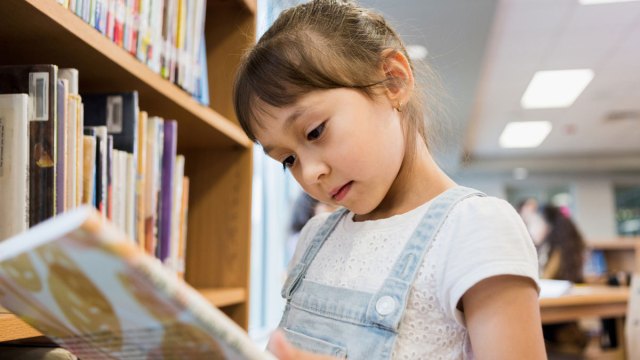When my daughter was in kindergarten, we signed up for the public library’s summer reading program. We only lasted a week. I guess we’re summer reading dropouts. Some of us thrive as “free-range readers”—and my kid is one of them.
Enrolling for summer reading was actually the most exciting part. A long line wound out the door of the children’s room, parents and kids pushing forward as if clamoring for concert tickets. I liked that there was a buzz around reading, and a social element.
I’m also a librarian (working with the big kids in high school), so I eat this stuff up. For years, we packed the library during the summer for crafts, Drag Queen Story Hour and a live reptile show. Really, anything that gets families through the door of the library is good. But the real question is what keeps kids turning the pages.
When my daughter proudly claimed her goodie bag, it looked just like the one from the dentist, except with a bookmark instead of a toothbrush. Before the first week was over, we lost everything in the bag. Her reading log, similar to a coffee shop loyalty rewards card, was supposed to be stamped weekly by the librarian, but we were too immersed in reading to fill it out. So this was a success—we were off and running!
But my daughter is a conscientious sort of person, and she really wanted to follow all the rules of the program. It was starting to feel like homework, and there were even some tears. “Honey, you can be in the summer reading program without doing all this stuff,” I said. “All you have to do is read!” My daughter brightened.
I appreciated all of the librarians’ efforts to promote reading, but I also wondered why kids needed rewards when reading is a gift in itself. Reading lists often make kids and parents feel pressured, as if they have a curriculum. And while they can be helpful in expanding our horizons and encouraging us to discover books we might not have otherwise picked up, they’re not one size fits all. In fact, I see them as only one recipe to consult when cooking a delicious feast.
Lists that are created by schools, libraries and literacy organizations are often highbrow, chock-full of Newberry Award winners. “If there’s a silver prize medal on a book’s cover, it’s going to be a sad book,” my daughter once observed. This led us both to wonder why funny or goofy books rarely win top children’s literature prizes (with Elephant and Piggy books by Mo Willems being a delightful exception). Honestly, your kid’s classmates and friends are just as good, if not better, resources than the contest judges who dole out accolades.
Meanwhile, a typical summer reading list will organize books by grade, but we can’t assume all kids of that age read at the same level or have the same learning needs. I’d suggest organizing lists in other ways. Is your child a visual learner? Do they like puzzles or riddles more than stories? Do they prefer graphic-heavy factual books? The Guinness Book of Records would not necessarily be on a school summer reading list, but these books are packed with rich vocabulary and historical and geographical facts. And the format of such books will appeal to a wide range of kids.
Then there’s the nearly 20% of the population who struggle with dyslexia and will require extra time and effort to learn to read. DK Publishing’s books on science, nature, dinosaurs and transportation will hook so many kids. The DK trademark style is a collage of dynamic, attention-grabbing photos arranged on a white background. Magazines like New Moon Girls, Ranger Rick, and Highlights are also great. Some kids are more nibblers than read-straight-through people, and that’s okay!
Reading a pop-up Alice in Wonderland turns storytelling into a three-dimensional, interactive reading experience. My daughter loved peering down a rabbit hole and manipulating the pages so the playing cards painted the roses red.
If you’re not sure where to start, catch your librarians when they have a minute and ask them to give you a personalized list based on your kid’s passions and interests. Each child needs—and deserves—a list tailored to exactly who they are.
As for us, my daughter and I ditched our reading list, but we gained so much more: giggling over joke books, cooing over Red Panda photos, researching roller coasters and marveling over the man with the longest mustache in the world. One of the best parts of summer is basking in the sunshine of kids’ excitement when they find that perfect book on the shelf.
Jess deCourcy Hinds (jessdecourcyhinds.com) is a writer and librarian. Sign up for her free quarterly newsletter, I’m an Open Book: On Love, Libraries and Life-building.
RELATED LINKS
These Fonts Help Kids with Dyslexia Dive into Reading
Dear Day Camp: Enough with the Crazy Hat Days
My Kid’s Summer Involves Zero Camps and Endless Fun











